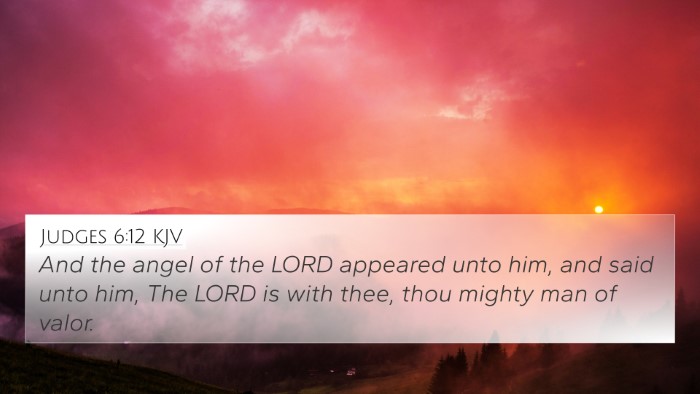Understanding Judges 11:1
Verse: Judges 11:1 - "Now Jephthah the Gileadite was a mighty warrior, but he was the son of a prostitute. Gilead was his father."
Summary of Insights
This verse introduces Jephthah, a key figure in the Book of Judges, highlighting his dual identity as both a "mighty warrior" and the "son of a prostitute." This introduction sets up a theme of redemption and warrior spirit amidst societal stigma. Jephthah’s origins play a crucial role in understanding his character and the challenges he faces.
Commentary Insights
According to Matthew Henry, Jephthah’s lineage emphasizes the complexities of his character—the inherent worth of God’s chosen, irrespective of their background. Jephthah’s skills as a warrior illustrate God’s ability to raise leaders from unexpected places.
Albert Barnes notes that Jephthah’s description as "the son of a prostitute" not only speaks of his social standing but also hints at the tension between his great abilities and his marginalized status. Despite this, God can elevate those labeled by society.
Adam Clarke emphasizes Jephthah’s calling to lead and rescue Israel, highlighting the paradox of a mighty warrior bearing the stigma of illegitimacy. Clarke presents Jephthah as a symbol of hope for those who feel marginal, showcasing God’s choice for leadership often contradicts human expectations.
Connections with Other Bible Verses
Judges 11:1 can connect with several other scriptures that illuminate themes of leadership, redemption, and societal acceptance. Here are some relevant cross-references:
- Hebrews 11:32-34 - Highlights Jephthah as a man of faith, included in the "Hall of Faith," showing how God acknowledges him beyond societal labels.
- 1 Samuel 16:7 - "For the Lord sees not as man sees," reinforces the theme of God choosing individuals based on the heart rather than outward appearances.
- Matthew 1:3 - Mentions Tamar, another individual from a complex lineage, illustrating God's use of unconventional backgrounds in divine lineage.
- Luke 4:18 - Jesus speaks of proclaiming good news to the poor, emphasizing divine favor upon those marginalized by society, resonating with Jephthah's situation.
- Romans 8:31 - "If God is for us, who can be against us?" This reflects the assurance of God’s support for those who may be undervalued or overlooked.
- Jeremiah 1:5 - "Before I formed you in the womb I knew you," reminds readers that God’s purpose for individuals is preordained, irrespective of societal factors.
- 1 Corinthians 1:26-29 - "Not many of you were wise according to worldly standards," urges believers to recognize God’s choice of the weak and lowly to shame the strong, similar to Jephthah’s journey.
Thematic Exploration
The introduction of Jephthah in Judges 11:1 invites readers to explore several theological themes:
- Redemption: The ability of God to redeem those with troubled beginnings.
- Warrior Spirit: The empowerment of individuals by God for the purpose of deliverance.
- Social Stigma: Addressing how societal labels do not determine one's significance in God's plan.
Cross-Referencing Biblical Texts
This verse serves as a rich ground for cross-referencing biblical texts, where the themes of acceptance, leadership, and divine orchestration come into harmony. Tools for Bible cross-referencing can help uncover deeper insights into the connections found throughout scriptures.
Tools and Methods for Cross-Referencing
Utilizing a bible concordance, one can effectively locate related verses, while a bible cross-reference guide can enhance understanding of the narratives surrounding Jephthah. Engaging in cross-reference Bible study allows for comparative analysis and thematic connections among scriptures.
Identifying Connections
Through detailed studies, believers can understand how to find cross-references in the Bible, revealing links that connect the Old and New Testaments. For instance, a comparative study of Pauline epistles can shed light on how themes in Judges resonate with New Testament teachings.
Conclusion
Judges 11:1 invites a deeper understanding of the dynamics at play in the life of Jephthah. His story reveals God’s sovereignty and choice in elevating individuals from obscurity, challenging believers to recognize the divine purpose within their own lives.
As you engage in your study, remember to embrace the wealth of cross-referenced themes and connections woven throughout scripture, discovering how God’s redemptive work continues to unfold in unexpected ways.





